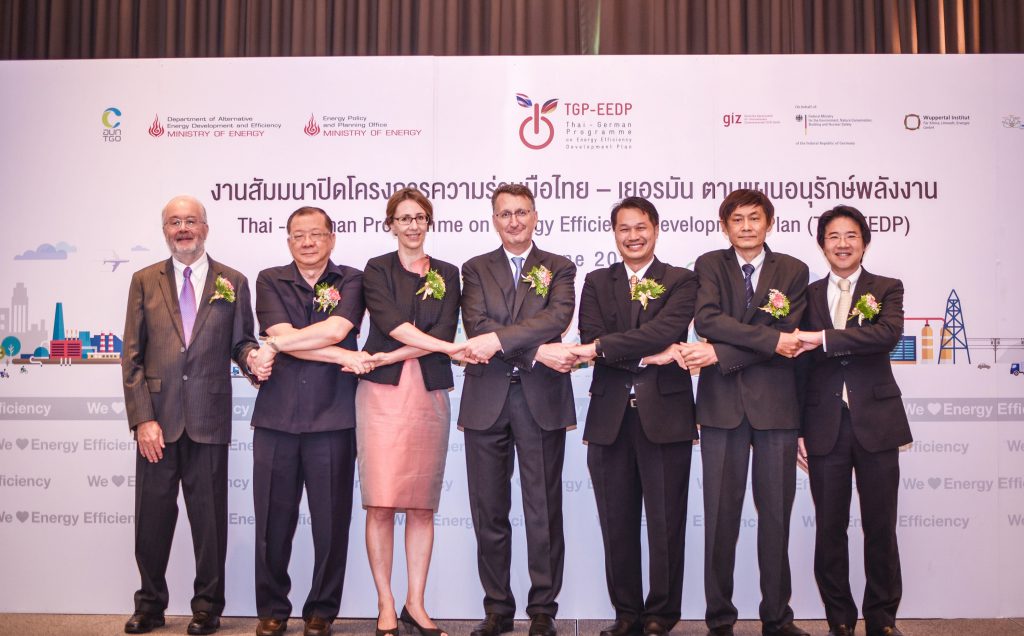(From left)
Dr. David Crossley, the Regulatory Assistance Project, Australia
Prof. Dr. Praipol Koomsup, Energy Expert
Dr. Milou Beerepoot, Project Director, the Deutsche Gesellschaft für Internationale Zusammenarbeit (GIZ) GmbH
H.E. Mr. Peter Prügel, Ambassador, Embassy of the Federal Republic of Germany in Thailand
Dr. Twarath Sutabutr, Director-General, the Energy Policy and Planning Office (EPPO)
Mr. Danai Egkamol, Deputy Director General, the Department of Alternative Energy Development and Efficiency (DEDE) and
Mr. Photjanart Sangpruaksa, First Senior Vice President, KBANK
At the closing ceremony of Thai- German Programme on Energy Efficiency Development Plan (TGP-EEDP). Under the TGP-EEDP, the Deutsche Gesellschaft für Internationale Zusammenarbeit (GIZ) GmbH – is cooperating with the Energy Policy and Planning Office (EPPO) under the Thai Ministry of Energy, to contribute to the further development and support the implementation of Thailand’s Energy Efficiency Plan (EEDP 2011-2030 and EEP, 2015-2036). The TGP-EEDP project aims at promoting the increase of energy efficiency in industry and building sectors to create a direct impact on CO2 emission reduction.
———————————————————————————–
Bangkok, 22 June 2016 –The Ministry of Energy, the Embassy of the Federal Republic of Germany in Thailand and Deutsche Gesellschaft für Internationale Zusammenarbeit (GIZ) GmbH are hosting the closing ceremony and seminar for the Thai-German Programme on Energy Efficiency Development Plan (TGP-EEDP). Under the TGP-EEDP, Deutsche Gesellschaft für Internationale Zusammenarbeit (GIZ) GmbH – is cooperating with the Energy Policy and Planning Office (EPPO) to support and contribute to the further development of Thailand’s Energy Efficiency Plan, funded by the German Federal Ministry for Environment, Nature Conservation, Building and Nuclear Safety (BMUB). The project is also supported by the Department of Alternative Energy Development and Efficiency (DEDE), the Thailand Greenhouse Gas Management Organization (TGO) and the Joint Graduate School of Energy and Environment (JGSEE) with collaboration of Wuppertal Institute, Germany.
Dr. Twarath Sutabutr, Director General of Energy Policy and Planning Office, Ministry of Energy, said the TGP-EEDP Project has been running for 4 years since 2013 and it aims at promoting the increase of energy efficiency in industry and building sectors by supporting the implementation of the Energy Efficiency (EE) plan which will create direct impact on CO2 emission reduction. He highlighted that nowadays energy conservation becomes an important item on the national agenda and requires not only a concrete government strategy, but also strong collaborations from all sectors and civil society. In fact, due to higher energy demand with limited resources, Thailand’s Energy Efficiency Plan (EEP) would be the key strategy and main contribution to the country’s energy security in long term.
Therefore, Dr. Twarath said “The Thai – German cooperation on TGP-EEDP project has enhanced the development of EEP and its results with policy recommendations. It would be very beneficial to the implementing phase of EE measures by applying lesson learned and good practices from other countries, especially new measures such as an obligation that gives the utilities a concrete responsibility in realising energy efficiency. Besides, the development of Energy Efficiency Indicators (EEI) databases can be used as a tool for effective monitoring and evaluation. TGP-EEDP has also supported the development of ‘Energy Efficiency Resource Standard (EERS)’ framework, an EE measure newly introduced to Thailand. The core activities have been contributing to making next steps in the implementation of the EEP in order to realise its ambitious targets of reducing Energy Intensity (EI) by 30 per cent in 2036 compared to that in 2010.
One of the outstanding outputs is the ‘Architectural Guidebook for High Energy Efficient Building Design’ aiming to encourage a higher energy efficient building design and to provide a design guideline for building proprietors and architects. The guidebook suggests that it is not difficult to design a building in accordance to BEC; and that designing a building envelop could be a challenging task for architects but could also be the key to higher energy efficient buildings in Thailand.
Furthermore, one of the interesting results of the project is the study with a useful proposal to integrate energy efficiency finance in the existing “Portfolio Guarantee Mechanism” of the Thai Credit Guarantee (TCG) under the Ministry of Finance in order to increase access to finance for SMEs and ESCO companies towards energy efficiency investment. This new financial guarantee instrument is currently under consideration by the Ministry of Energy, in terms of its potential to scale up sector investment in energy efficiency and to enhance the ESCO market with more holistic services. The proposal can provide substantial contributions to the country’s energy saving target of EEP2015 and at the same time reduce Green House Gas emissions.
In addition, H.E. Mr. Peter Prügel, Ambassador of the Federal Republic of Germany in Thailand underlines the longstanding relationship between Germany and Thailand over 150 years and the closeness of Thai-German technical cooperation in various fields related to sustainable development. In Thailand, several activities of GIZ target the improvement of the energy sector in a sustainable and climate-friendly way. With regards to energy efficiency, GIZ’s programme on Energy Efficiency Development Plan or TGP-EEDP implemented by GIZ since 2013 in cooperation with the Energy Policy and Planning Office (EPPO), contributed to the further development and support of the implementation of the EEP. This ultimately aims to the successful achievement of the country’s ambitious energy saving target and energy security. It will also contribute to the United Nations Framework Convention on Climate Change (UNFCCC) agreement in Paris in 2015, at which Thailand expressed the intention to substantially reduce greenhouse gas emissions in the transportation and energy sectors.
